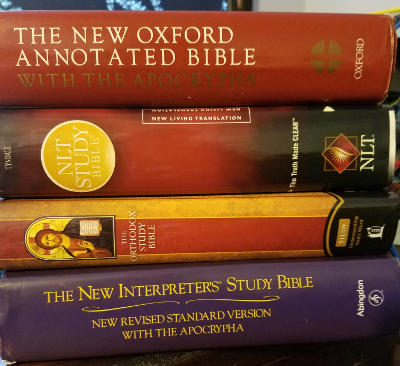Galatians 2:16 – A Problem in Translation and Theology
I wanted to write a quick note here as this relates to my study tonight, as well as illustrating quite a number of translation problems. Here is our text, with CEV (NOT CEB) to the left, NRSV in the center as a “literal” comparison, and NLT to the right. I’m copying the NRSV notes as they highlight the issue.
But we know that God accepts only those who have faith in Jesus Christ. No one can please God by simply obeying the Law. So we put our faith in Christ Jesus and God accepted us because of our faith.
yet we know that a person is justifiedd not by the works of the law but through faith in Jesus Christ.e And we have come to believe in Christ Jesus, so that we might be justified by faith in Christ,f and not by doing the works of the law, because no one will be justified by the works of the law.
Notes: d. Or reckoned as righteous and so elsewhere. e. Or the faith of Jesus Christ. f. Or the faith of Jesus Christ.
(The Holy Bible: New Revised Standard Version. (1989). (Ga 2:16). Nashville: Thomas Nelson Publishers.
“Yet we know that a person is made right with God by faith in Jesus Christ, not by obeying the law. And we have believed in Christ Jesus, so that we might be made right with God because of our faith in Christ, not because we have obeyed the law. For no one will ever be made right with God by obeying the law.”
Tyndale House Publishers. (2013). Holy Bible: New Living Translation (Ga 2:16). Carol Stream, IL: Tyndale House Publishers.
If you look at notes e & f which are identical, you’ll see the problem. The Greek text can justifiably be translated either as “faith in Christ,” that is, our faith directed to Christ, or as “the faith of Christ,” Christ’s faithfulness to us. That’s not an insignificant difference. The NRSV does well here by translating one way and footnoting another. The problem is that people rarely read footnotes. In a Dynamic Equivalence (or functional) version the translator is obliged to make a choice. You cannot clearly express the meaning of the original in a new language if you have not understood it. Having understood it (you think), there is always the possibility that you have misunderstood it.
This is another important reason why I urge people who study the Bible in translation to both use more than one and also to read translator’s footnotes. They can be critical.
(See MyBibleVersion.com for some comparisons.)

Good advice! The only reason I prefer KJV is because it’s in my DNA from my early preschool hearing and early reading years. Bought “The Message” when it came out with the OT. Always read footnotes. The NSRV throws me off just enough for memory that I don’t read it. Like the new paraphrases for reading straight through. Wonder what you think of the NIV.
I consider the NIV a good, balanced translation from an evangelical viewpoint. It has the advantage of popularity. It’s not my favorite, but it’s good.
This tension between the objective and subjective genitive has been around for some time. It is good to see you put it so succinctly here.
What are the consequences for us of Jesus’ faithfulness, and our conviction in him? It must be more than a matter of ‘understanding’. And then continuing with our comfortable lives. I have been reading Jim Gordon’s posts at Living Wittily. I wonder if American Christians can do what is required today. Especially those who have political influence.
Here is what Jim says in the post on the beatitudes: “The world watched, and heard, as the Beatitudes were read on Capitol Hill in Washington at the inauguration of the 45th President. They were then rubbished by the content of the inaugural speech.”
His next post is even more stark – on yes or no as a response to executive orders. I hope your major cities can hold out with their sanctuaries. They are a yes to God and a no to the error of one who thinks he is everybody’s boss.
If I hope, I must also pray. The border prevents direct action for me – but I am not one who likes demonstrations anyway. I only hope I can learn to interpret and act graciously on what I am learning from the Bible. But grace is not tolerance of error. The prophets make this quite clear. And I fear that I value my comfortable life. As such I will suffer the fate of destruction and exile as much as any leaders in government – mine or the nation to the south of me.
I’ve just posted a quick note on refugees. I think one of the messages of scripture is that we respond to Christ’s faithfulness with faithfulness. And being faithful to Jesus is a substantial thing.